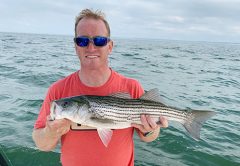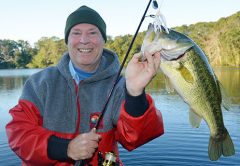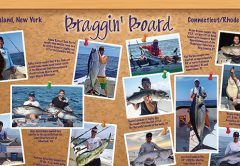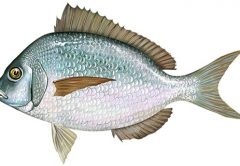By Zach Harvey
As much as the whole chartering occupation feels like a dream job to many who haven’t made that set of ill-advised career choices, make no mistake: It takes an unusual combination of personal traits, an uncommon work ethic, and an almost bottomless reserve of patience to make a go of it. It takes much more than that to do the job at the highest levels of the sport. I will concede that when the weather’s perfect, the fishing is so good a total moron could sink the boat with stripers, and the people are world’s nicest, it doesn’t necessarily feel much like work. So for about an eighth of a typical season, charter fishing is a dream job. The rest of the time it feels remarkably like…well…work.
One aspect of the trade that can drag the work down across the love-my-job threshold into the realm of pure drudgery is the need to catch a specific fish during a predetermined window of time for clients when the species in question is about as readily available as a steamer trunk full of gold doubloons. Now, hit that scenario with the worst known combination of wind, weather, and sea conditions for that specific fishery, then pour half a liquor cabinet down your six clients’ collective gullet, throw in some engine troubles, and you have the recipe for a day’s work that makes water-boarding look like a crisp autumn day of apple picking on Grandma and Grandpa’s farm.
For the point of this piece, let’s back up a step to, say, a scheduled striper charter when, for whatever reason or reasons, the bass have pulled one of their infamous disappearing acts. You, the charter, have spent weeks talking today up and sharing your excitement and having t-shirts made up and the Big Morning’s finally here and you heard they absolutely crushed the big fish last week and your expectations are that you’ll be throwing 50-pounders back by 7 a.m.
That’s when the captain, a solemn, half-apologetic look on his face, informs you that the striper fishing headed straight down the crapper four days ago—no one in the working fleet has managed to scrape up more than a keeper or two since—and notes, as diplomatically as possible under the circumstances, that he’s willing to give it a whirl if you’re absolutely hell-bent on bass fishing, but advises you that the fluke fishing has been lights-out over at Block Island, some big sea bass mixed in.
Unfortunately, because there’s a financial transaction involved, part of you is suspicious of this man’s motives. You look at the mate but his face wears the same look of gravity. On the one hand, you have four months of high anticipation that was going strong until you climbed aboard, and on the other, you have a skipper telling you the fishing you were dying to do has fallen apart. There’s always a chance things could turn around today, but neither captain nor mate is expecting miracles in that department. Then there’s the plan B he’s proposing…
You’ve always charter-fished for striped bass exclusively, so you’re not really sure what to expect if you follow the man’s advice. This, naturally, is the exact kind of scenario where it pays huge dividends to find a captain you trust and stick with that boat through thick and thin. For my part—granted, I’ve worked deck for almost two decades, so I’ll admit some bias here—I would lean toward deferring to your skipper if he’s pushing a Plan B. As a side note, take it from me that the overwhelming majority of charter captains are “people people,” so to speak. They don’t love delivering bad news. Many sincerely want to reschedule or hand you the deposit back rather than taking you out when the fishing isn’t so hot.
With that said, the bottom line is that charter fishing as an occupation hangs on the whims of Mother Nature. When you’re booking dates months in advance, there’s no way of knowing how fishing will shake out. What you’re buying when you book that day is a day’s fishing; the “catching” you hope to do, you cannot buy for all the proverbial tea in China. But if you fish with a guy consistently over years, the law of averages is quite likely to give you some slammer trips. It will also give you some duds—that’s the nature of the racket. Point is, a guy who waited until the fishing was red-hot to take you would be in debtor’s prison thinking about shanking Mother Nature out in the exercise yard. It’s just not reasonable to expect—never mind actually ask—a skipper for such an accommodation.
Often, a good charter captain will be thinking about a number of variables you hadn’t even considered when he suggests a change in the original game plan. Especially when you’ve fished with a guy for years, he’ll be factoring in your actual skills, the people in your group, the sea conditions he expects out at various spots, the weather forecasts, drift conditions, the angle of the steam to the grounds relative to wave action, recent intel from other charter, party, and even commercial boats, and a dozen other pieces of the puzzle particular to each day in his chosen field of professional toil. If you’ve lined yourself up with a reputable boat and crew, you should make it a point to trust in the expertise behind that reputation.
When you think about it, a captain who is steering you away from the original agreed-upon terms of the charter is taking on a huge additional amount of pressure to produce. Not only must he overcome your disappointment; he must prove the validity of his hunch by showing you a bang-up day on the water.
Some of the happiest charter clients I’ve seen over years on deck have been folks who followed a captain’s Plan B advice. I’ve actually seen a number of stripers-or-bust groups turn into full-blown fluke or sea bass junkies: A season after a sagging bass bite ruined their plan, they call back to book four full days of fluke fishing. If you hope to get the most out of your charter-fishing dollar (and also your precious non-working hours), you’ll never go wrong keeping an open mind and rolling with the swells as they jostle you off-course.
[easy-social-share]










